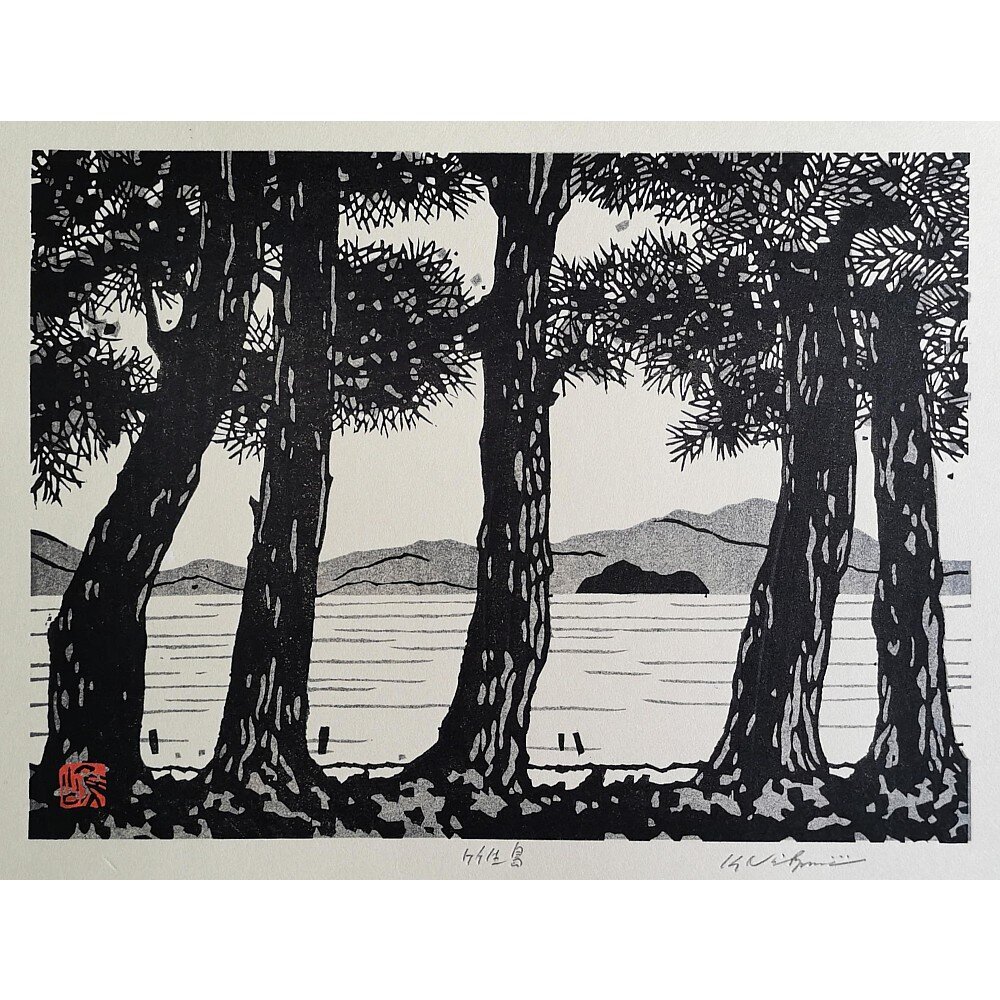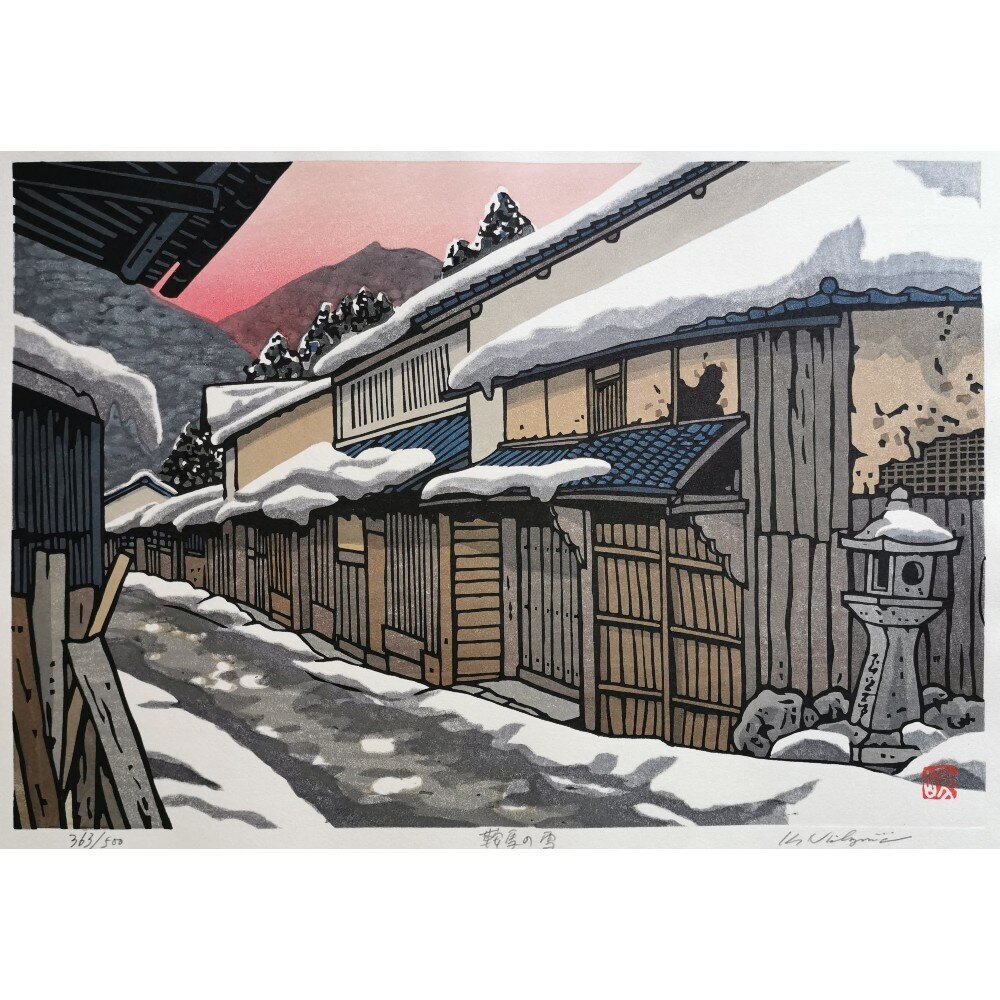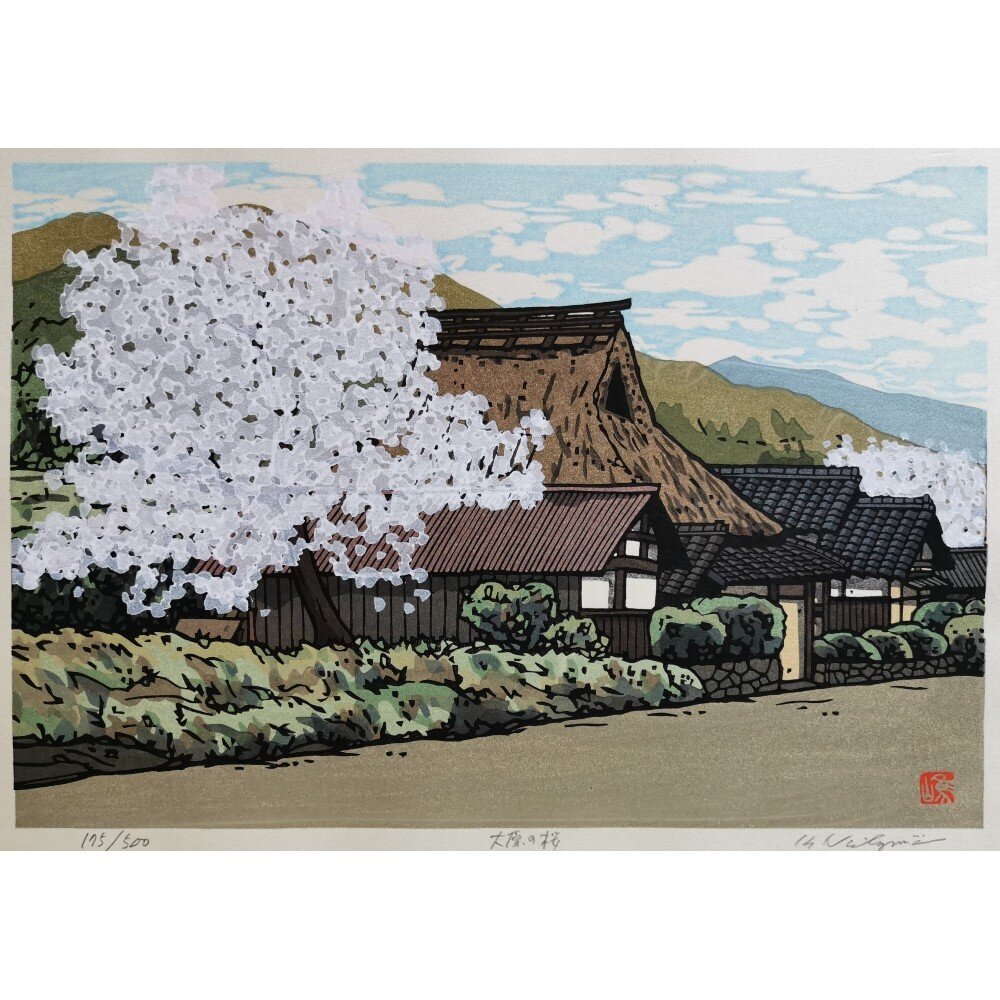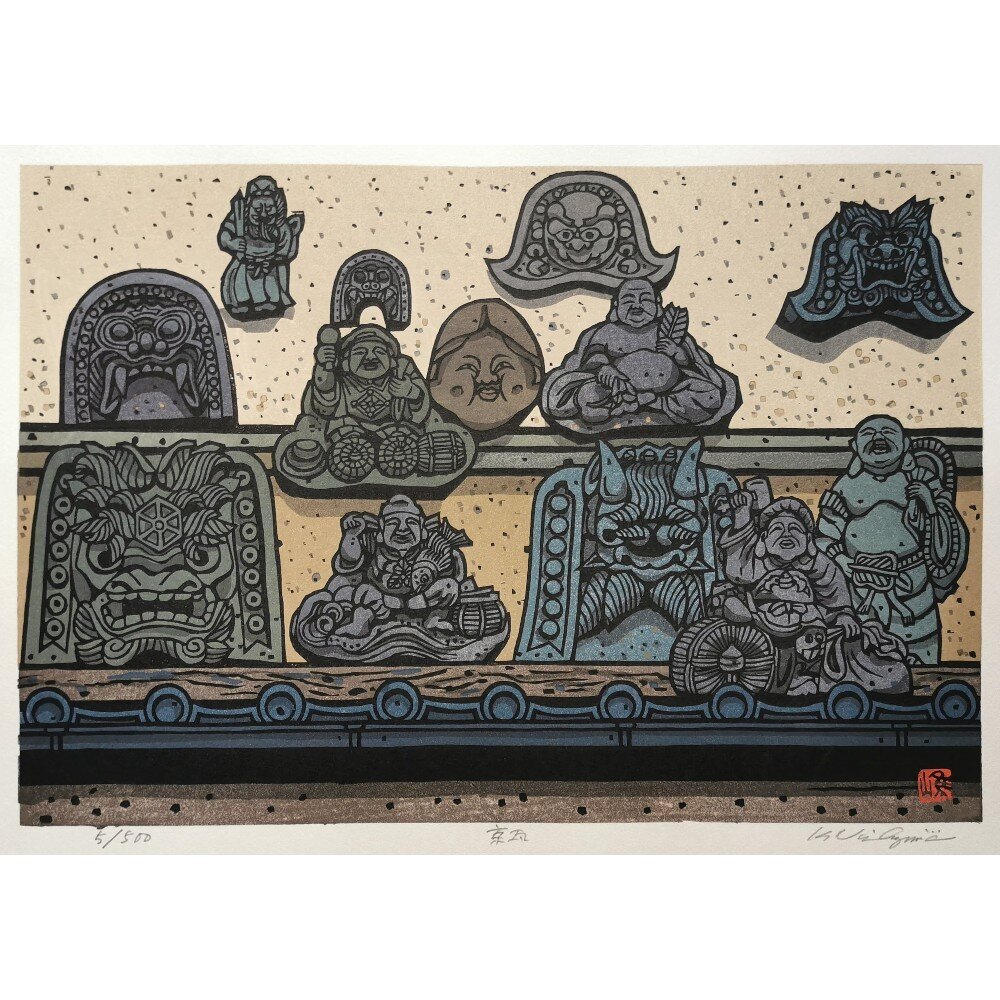

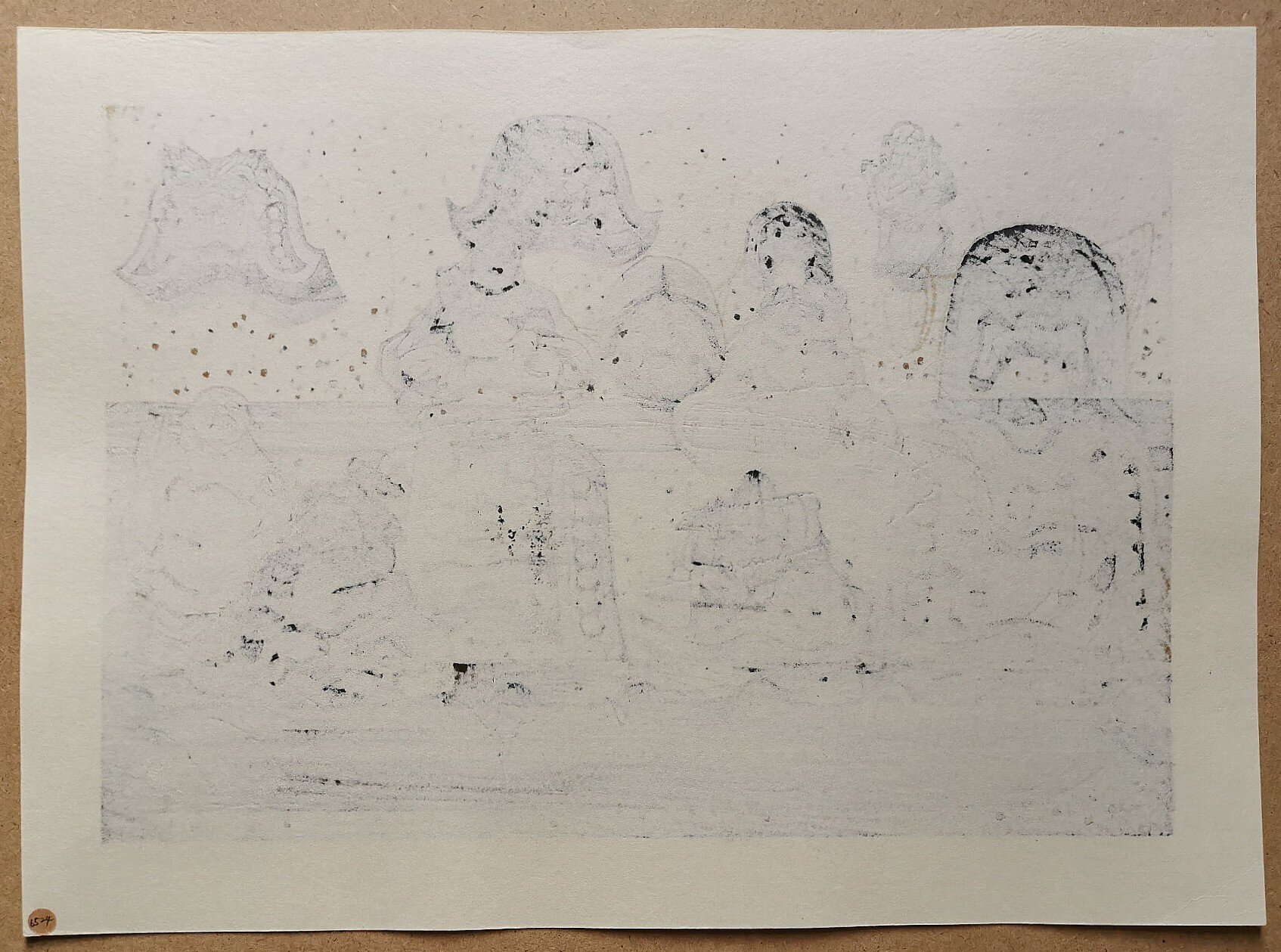
Katsuyuki Nishijima - 京瓦 "Kyogawara"
Title: 京瓦 "Kyogawara". Ed./500.
Artist: Katsuyuki Nishijima (1945-Present).
Signed & Dated: Signed and titled in Pencil. 2016.
Medium: Woodblock Print.
Paper Size: Approx: W: 43.50cm x H: 31.50cm. (Image Size: W: 37.75cm x H: 25.75cm).
Condition: Mint. Please refer to photos / Contact for any further questions & condition report.
Notes:
One of the most iconic images of Japan, & often subject to many 20th Century print artist, are the scenes of traditionally tiled townhouses (machiya), castle, & temple rooftops. The clay fired roof tiles (“kawara”) are always typically found dressed alongside Onigawara (鬼瓦) - Oni-headed figureheads rooted in Japanese folklore, & placed along eaves to ward against evil.
In this image titled 京瓦 "Kyogawara" - the traditional roof tiles & Onigawara specific to Kyoto - Katsuyuki Nishijima presents a collection of Kyoto’s Onigawara. A culturally rich image, which again, Nishijima leaves for us to uncover.
Shōki 鍾馗 (Zhong Kui): A talisman of Kyoto’s roof-scape - famed and loved in the city more than anywhere else in Japan.
Otafuku お多福: The smiling, round-face woman.
Daikoku 大黒天 & Ebisu 恵比寿: Two of the Seven Gods of Fortune (“Shichi-fuku-jin” (七福神), and often depicted together as a pair. Daikoku 大黒天: Carrying his large sack of treasure, a small magical mallet, and often sitting upon a bag of rice, Daikoku brings fortune to the land, agriculture, & wealth. Ebisu 恵比寿: The God of fishermen & fortune, carries a large fish in one hand, a fishing rod the other.
Demon/Goblin Onigawara masks: Two horned demon masks & faces. Likely designs rooted to Kyoto’s original/ancient Heian Onigawara artefacts - such as the large goblin Oni on display at Todaiji Temple, Nara, & those excavated from the ruins of Heian Palace Toyorakuden, Kyoto.
Hotei 布袋: Another of the Seven Gods of Fortune (“Shichi-fuku-jin” (七福神). The laughing, large bellied Buddha whom carries his large sack of fortunes and ceremonial fan; Hotei is the God of happiness, patron of bartenders, & protector of children.
Research suggests this collection of Onigawara adorns a building somewhere within Motoyoshicho, Higashiyama-ku, Kyoto…
Discover more/Interesting articles:
Learn all about Kyogawara with one of the last active craftsmen: Akihisa Asada. Learn all about the craft, its history, how they are made, or purchase your very own Onigawara! https://www.kyogawara.com/index.php
About that little man above Kyoto’s doorways, XJ Lee 2020: https://crafttabby.com/explore/shoki-san
Daikoku and Ebisu: Two Japanese deities of good fortune: https://blogs.bl.uk/asian-and-african/2016/11/daikoku-and-ebisu-two-japanese-deities-of-good-fortune.html
Katsuyuki Nishijima - 京瓦 "Kyogawara"
Title: 京瓦 "Kyogawara". Ed./500.
Artist: Katsuyuki Nishijima (1945-Present).
Signed & Dated: Signed and titled in Pencil. 2016.
Medium: Woodblock Print.
Paper Size: Approx: W: 43.50cm x H: 31.50cm. (Image Size: W: 37.75cm x H: 25.75cm).
Condition: Mint. Please refer to photos / Contact for any further questions & condition report.
Notes:
One of the most iconic images of Japan, & often subject to many 20th Century print artist, are the scenes of traditionally tiled townhouses (machiya), castle, & temple rooftops. The clay fired roof tiles (“kawara”) are always typically found dressed alongside Onigawara (鬼瓦) - Oni-headed figureheads rooted in Japanese folklore, & placed along eaves to ward against evil.
In this image titled 京瓦 "Kyogawara" - the traditional roof tiles & Onigawara specific to Kyoto - Katsuyuki Nishijima presents a collection of Kyoto’s Onigawara. A culturally rich image, which again, Nishijima leaves for us to uncover.
Shōki 鍾馗 (Zhong Kui): A talisman of Kyoto’s roof-scape - famed and loved in the city more than anywhere else in Japan.
Otafuku お多福: The smiling, round-face woman.
Daikoku 大黒天 & Ebisu 恵比寿: Two of the Seven Gods of Fortune (“Shichi-fuku-jin” (七福神), and often depicted together as a pair. Daikoku 大黒天: Carrying his large sack of treasure, a small magical mallet, and often sitting upon a bag of rice, Daikoku brings fortune to the land, agriculture, & wealth. Ebisu 恵比寿: The God of fishermen & fortune, carries a large fish in one hand, a fishing rod the other.
Demon/Goblin Onigawara masks: Two horned demon masks & faces. Likely designs rooted to Kyoto’s original/ancient Heian Onigawara artefacts - such as the large goblin Oni on display at Todaiji Temple, Nara, & those excavated from the ruins of Heian Palace Toyorakuden, Kyoto.
Hotei 布袋: Another of the Seven Gods of Fortune (“Shichi-fuku-jin” (七福神). The laughing, large bellied Buddha whom carries his large sack of fortunes and ceremonial fan; Hotei is the God of happiness, patron of bartenders, & protector of children.
Research suggests this collection of Onigawara adorns a building somewhere within Motoyoshicho, Higashiyama-ku, Kyoto…
Discover more/Interesting articles:
Learn all about Kyogawara with one of the last active craftsmen: Akihisa Asada. Learn all about the craft, its history, how they are made, or purchase your very own Onigawara! https://www.kyogawara.com/index.php
About that little man above Kyoto’s doorways, XJ Lee 2020: https://crafttabby.com/explore/shoki-san
Daikoku and Ebisu: Two Japanese deities of good fortune: https://blogs.bl.uk/asian-and-african/2016/11/daikoku-and-ebisu-two-japanese-deities-of-good-fortune.html

